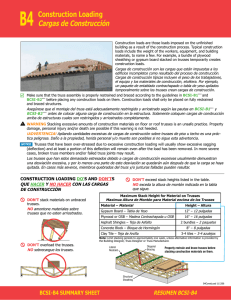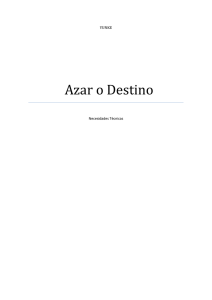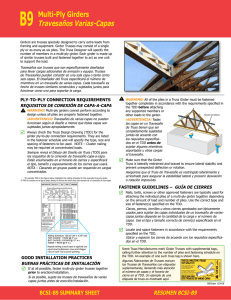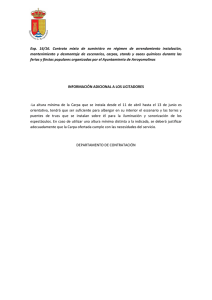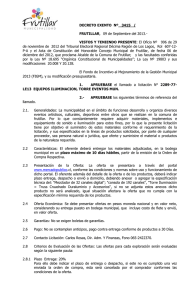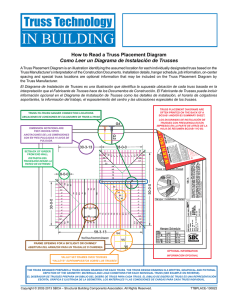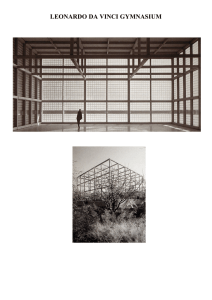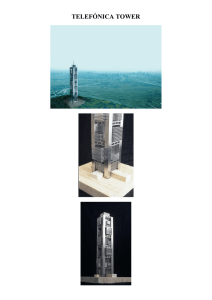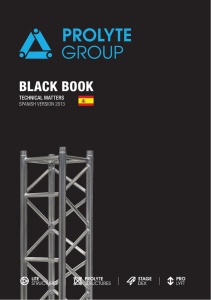Construction Loading Cargas de Construcción
Anuncio
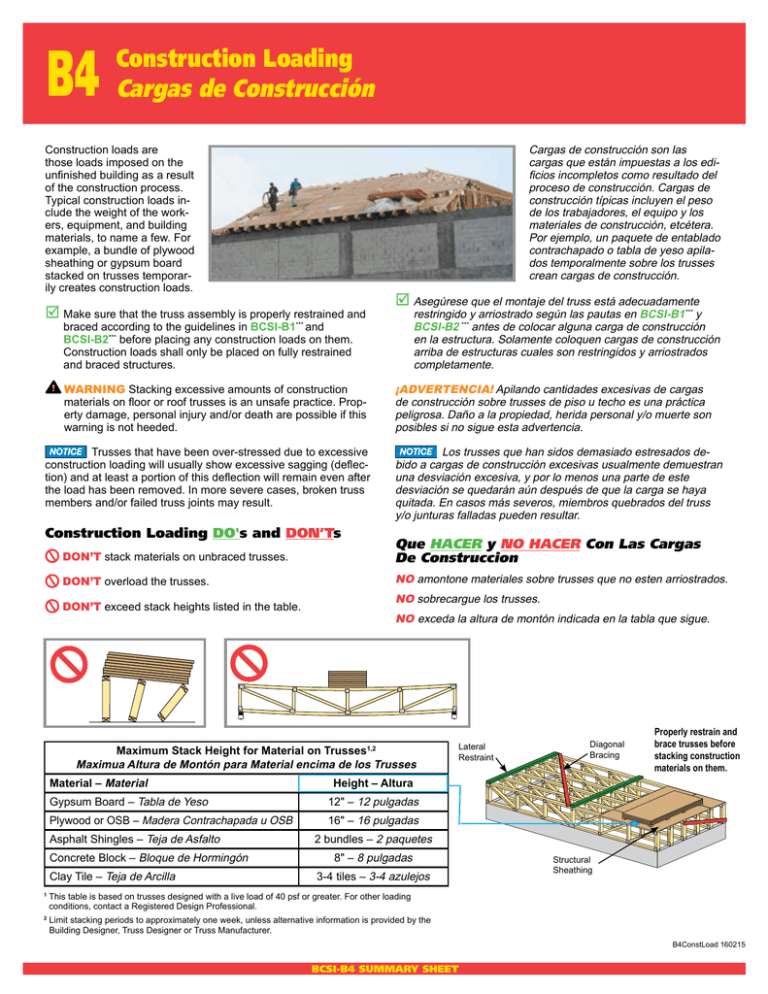
B4 Construction Loading Cargas de Construcción Cargas de construcción son las cargas que están impuestas a los edificios incompletos como resultado del proceso de construcción. Cargas de construcción típicas incluyen el peso de los trabajadores, el equipo y los materiales de construcción, etcétera. Por ejemplo, un paquete de entablado contrachapado o tabla de yeso apilados temporalmente sobre los trusses crean cargas de construcción. Construction loads are those loads imposed on the unfinished building as a result of the construction process. Typical construction loads include the weight of the workers, equipment, and building materials, to name a few. For example, a bundle of plywood sheathing or gypsum board stacked on trusses temporarily creates construction loads. þ Asegúrese que el montaje del truss está adecuadamente þ Make sure that the truss assembly is properly restrained and restringido y arriostrado según las pautas en BCSI-B1*** y BCSI-B2 *** antes de colocar alguna carga de construcción en la estructura. Solamente coloquen cargas de construcción arriba de estructuras cuales son restringidos y arriostrados completamente. braced according to the guidelines in BCSI-B1*** and BCSI-B2*** before placing any construction loads on them. Construction loads shall only be placed on fully restrained and braced structures. ¡ADVERTENCIA! Apilando cantidades excesivas de cargas de construcción sobre trusses de piso u techo es una práctica peligrosa. Daño a la propiedad, herida personal y/o muerte son posibles si no sigue esta advertencia. WARNING Stacking excessive amounts of construction materials on floor or roof trusses is an unsafe practice. Property damage, personal injury and/or death are possible if this warning is not heeded. Trusses that have been over-stressed due to excessive construction loading will usually show excessive sagging (deflection) and at least a portion of this deflection will remain even after the load has been removed. In more severe cases, broken truss members and/or failed truss joints may result. Construction Loading DO's and DON’Ts Los trusses que han sidos demasiado estresados debido a cargas de construcción excesivas usualmente demuestran una desviación excesiva, y por lo menos una parte de este desviación se quedarán aún después de que la carga se haya quitada. En casos más severos, miembros quebrados del truss y/o junturas falladas pueden resultar. DON’T stack materials on unbraced trusses. Que HACER y NO HACER Con Las Cargas De Construccion DON’T overload the trusses. NO amontone materiales sobre trusses que no esten arriostrados. NO sobrecargue los trusses. DON’T exceed stack heights listed in the table. NO exceda la altura de montón indicada en la tabla que sigue. Maximum Stack Height for Material on Trusses Maximua Altura de Montón para Material encima de los Trusses 1,2 Material – Material 12" – 12 pulgadas Plywood or OSB – Madera Contrachapada u OSB 16" – 16 pulgadas Concrete Block – Bloque de Hormingón Clay Tile – Teja de Arcilla Diagonal Bracing Properly restrain and brace trusses before stacking construction materials on them. Height – Altura Gypsum Board – Tabla de Yeso Asphalt Shingles – Teja de Asfalto Lateral Restraint 2 bundles – 2 paquetes 8" – 8 pulgadas 3-4 tiles – 3-4 azulejos 1 his table is based on trusses designed with a live load of 40 psf or greater. For other loading T conditions, contact a Registered Design Professional. 2 imit stacking periods to approximately one week, unless alternative information is provided by the L Building Designer, Truss Designer or Truss Manufacturer. Structural Sheathing B4ConstLoad 160215 BCSI-B4 SUMMARY SHEET CONSTRUCTION LOADING SÍ distribuye cargas sobre el mayor numero de trusses que sea posible. Posicione perpendicular a los trusses los montones de materiales llanas con la dimensión más larga como se indica el dibujo. O distribute loads over as many D trusses as possible. Position stacks of materials flat with the longest dimension perpendicular to the trusses, as shown. NO permite que el montón se incline contra ninguna pared, o apile materiales para sobrecarguen uno u grupos pequeños de trusses. ON’T allow the stack to lean D against walls, or stack materials so they overload single or small groups of trusses. SÍ amontone materiales al lado de los soportes exteriores o directamente sobre los soportes interiores de estructuras que están restringidos y arriostradas apropiadamente. O stack materials along exD terior supports or directly over interior supports of properly restrained and braced structures. Note: Truss bracing not shown for clarity. ON’T stack materials at or near D the midspan of the truss. Never exceed stack heights provided in the table (see page 1) unless alternative information is provided by the Building Designer, Truss Designer or Truss Manufacturer. NO amonte los materiales en or cerca de la mitad del braguero. Nunca sobrepase alturas de montón indicadas en la tabla (véase la página 1) a menos que información alternativa sea indicada por el Diseñador del Edificio, el Diseñador del Braguero, o el Fabricante del Braguero. NO deje caer cargas arriba de los trusses. El impacto puedo dañar los trusses aunque si sea pequeña la carga. SÍ deje materiales de construccción arriba del equipo de levantar hasta la instalación, si es posible. NO amontone materiales en un lugar que puede producir inestabilidad como en voladiza, salientes o cerca de las conecciones de trusses-a-travesaño. NO apile tile de sobra y/o otros residuos de construcción sobre los trusses. DON’T drop materials on trusses. The impact can damage the trusses even if the weight of the material is small. Cantilever Girder Truss DO leave construction materials on lifting equipment until installation, if possible. *** DON’T pile cut-off tile and/or other construction waste on trusses. DON’T stack materials at locations that will produce instability, such as on cantilevers, overhangs or near trussto-girder connections. Contact the component manufacturer to obtain the referenced document or consult a Registered Design Professional for more information on this subject. To view a non-printing PDF of this document, visit sbcindustry.com/b4. This document summarizes the information provided in Section B4 of the 2013 Edition of Building Component Safety Information BCSI - Guide to Good Practice for Handling, Installing, Restraining & Bracing of Metal Plate Connected Wood Trusses. Copyright © 2004-2016 Structural Building Components Association and Truss Plate Institute. All Rights Reserved. This guide or any part thereof may not be reproduced in any form without the written permission of the publishers. Printed in the United States of America. Truss Plate Institute 218 North Lee Street, Ste. 312 Alexandria, VA 22314 703-683-1010 • tpinst.org 6300 Enterprise Lane • Madison, WI 53719 608-274-4849 • sbcindustry.com BCSI-B4 SUMMARY SHEET
